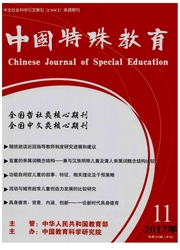

 中文摘要:
中文摘要:
为探讨体感游戏对智障儿童的日常功能、交流能力和移动能力的干预效果,本研究随机选取187名智力障碍儿童,实验组112名,对照组75名,利用自主研发的体感游戏对实验组进行为期8周的干预,并在实验前后采用能力低下儿童评估量表(PEDI)对两组被试进行评定。结果表明:体感游戏对实验组儿童的日常功能、移动能力和交流能力存在显著影响,实验组在这三个维度上的后测分数显著高于对照组。而对照组前后测分数无明显差异。这提示,体感游戏对智障儿童的日常功能、移动能力和交流能力的提升均有良好的效用。
 英文摘要:
英文摘要:
This study aims to explore the effect of motion sensing games on intellectually disabled children’s daily function,communication skill and movement skill,by intervening in 187 children with intellectual disabilities,who were divided into two groups( 112 in the experimental group and 75 in the control group),with a self-developed motion sensing games and the Pediatric Evaluation of Disability Inventory( PEDI). The results show the following: The motion sensing games had a significant effect on the experimental group,who scored significantly higher than the control group in the post-test in their daily function,movement skiu and communication skill; and the control group showed no significant difference between the protest and the post-test. The study concludes that the motion sensing games have a good effect on intellectually disabled children’s daily function,movement skill and communication skill.
 同期刊论文项目
同期刊论文项目
 同项目期刊论文
同项目期刊论文
 期刊信息
期刊信息
